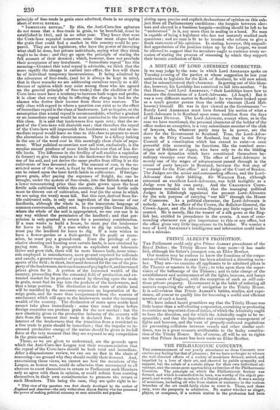A MISTAKE OF LORD ABERDEEN CORRECTED. Ir we may judge
by the tone in which Lord ABERDEEN spoke on Tuesday evening of the parties at whose suggestion he last year undertook to legislate for the Kirk of Scotland, he will now admit that be misunderstood their character. In getting out of this blun- der, however, his Lordship has contrived to fall into another. " In that House," said Lord ABERDEEN, "their Lordships knew how to measure the dimensions of a Lord-Advocate. (A laugh.) But it was a very different matter in Scotland : be was there looked upon as a much greater person than the noble viscount (Lord Mel- bourne) himself. He was in fact viewed as the Government."— Surely Lord ABERDEEN must have formed his notion of what a Lord-Advocate is in Scotland upon some tradition from the days of HARRY DUNDAS. The Lord-Advocate, except when, as in the case we have mentioned, the personal character of the holder of the office makes an exception, is a very subordinate member of the club of lawyers, who, whatever party may be in power, are the doers for the Government in Scotland. True, the Lord-Advo- cate is the Privy Council for Scotland, but that is the Privy Council of a constitution which has ceased to exist—a once powerful title screening its functions, like the nominal sove- reigns of Bokhara or Japan, who have only to do the bidding of the new dynasties which have constituted themselves he- reditary viceroys over them. The office of Lord-Advocate is merely one of the stages of advancement passed through in the career of party lawyers in Scotland, between the first step of " counsel for the Post-office" and Judge of the Court of Session. The Judges are the senior and commanding officers, and the Lord- Advocate does their bidding. Sir WILLIAM RAE, although esteemed an excellent Lord-Advocate, was held ineligible as a Judge even by his own party. And the CRANSTOUN Corre- spondence revealed to the world, that the managing political Judges in Edinburgh appointed the present Lord-Advocate for the sole purpose of carrying "our bill" through the House of Commons. As a political character, the Lord-Advocate is nobody. As a law-officer of the Crown, the Solicitor-General, the Crown-Agent, and the Advocates-Depute pay little regard to his control. He is merely, like the wearer cif a silk gown at the Eng- lish bar, entitled to precedence in the courts. A man of com- manding character can give importance to this or any office, but the office gives very little importance to its bolder. We wonder a man of Lord ABERDEEN'S intelligence and information could make such a mistake.


























 Previous page
Previous page